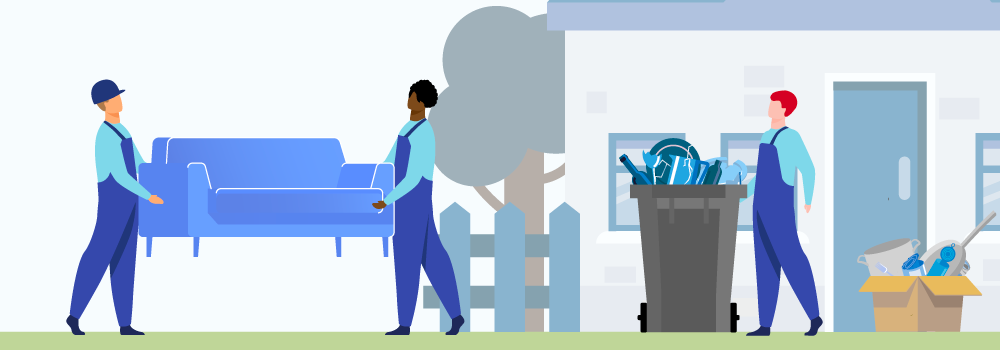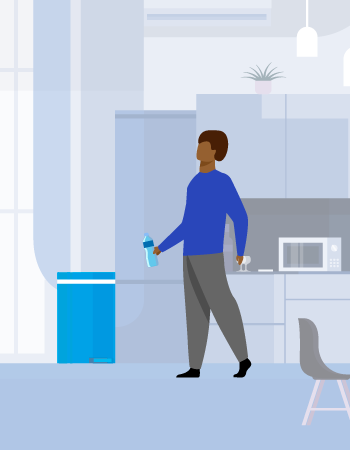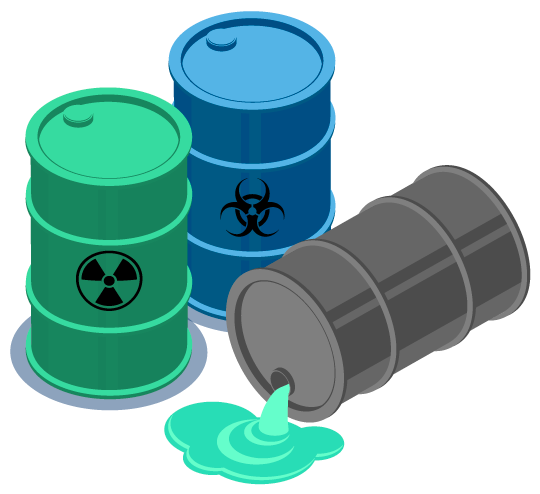The terms “household waste”, “household rubbish”, and “domestic waste” refer to solid waste that is generated in a home—be that a house, flat, or other private residences. Many people find private waste collection services useful to suit their unique situations and busy lifestyle.

What is Household General Waste?
Household general waste can include card and paper items (newspapers, magazines, and boxes), metal and glass food containers (cans, bottles, and jars), as well as food scraps, disposables, clothing, compost, and garden trimmings. Domestic clearance can cover these general items in small quantities, or include larger house clearances after someone has passed away for example.

House general waste can be separated into the following categories:
Plastic Waste
While plastic is very useful, it is unfortunately not biodegradable. This means that any plastic going to landfill will sit there for thousands of years. However, lots of plastics can be recycled when sent to the proper disposal channels.
Metal Waste
Metal waste includes items such as tins and cans, which can generally be recycled easily.
Paper or Card Waste
From birthday cards and wrapping paper to newspapers and magazines, or food boxes and clothing shop labels, paper and cardboard are everywhere and can be easily recycled.
Ceramics and Glass
Glass bottles and jars from food and beauty items, as well as broken glass or ceramic crockery, can all be recycled and broken down.
Liquid Waste
Most liquid waste can be disposed of easily, by pouring them down the drain, but it’s not safe to do this with hazardous liquid waste. Inedible oils, fuel, detergents, and solvents are among some of the liquid wastes that need careful and thoughtful disposal.
Organic Waste
Organic waste is waste that can be broken down and decomposed. Garden waste and food scraps are regarded as organic waste due to their ability to biodegrade thanks to microorganisms.
Recyclable Waste
Recycling reduces the amount of waste sent to landfill and is the most eco-friendly option for waste removal, when possible. Most paper, card, and metal can be recycled and some plastics can too.
Hazardous Waste
Hazardous Waste is waste that is detrimental to human health or the environment. Many chemicals and inedible oils fall under the umbrella of hazardous waste. It can also include WEEE. WEEE stands for waste electrical and electronic equipment and includes everything from desk fans to mobile phones to computers. WEEE disposal requires specialist knowledge.
How Household Rubbish Can Be Disposed of
Local councils are legally obliged to offer a household waste removal service. However, the length of time between these removals is growing due to various constraints. Typically there are two weeks between rubbish collections and these alternate between collection of general waste and recycling.
Council workers will also often refuse to collect if there is too much rubbish or waste that won’t fit inside the bin.
There is also the option of removing household waste independently of the council schedule by taking it to the local tip, but this is of course dependent on mobility and transport, as well as the tip opening schedule. Council-run tips also have limitations in how much and what kind of waste they can accept.

While the council does remove rubbish, the third and final option is to arrange private waste disposal with a reputable waste removal company. A waste removal company will be able to remove any waste you have, including hazardous waste that local collections may refuse, and ensure it is disposed of safely and responsibly. This is also an excellent choice for situations where you need a large rubbish collection in London, and it is too much for local collections to handle.
What is Hazardous Household Waste?
Hazardous household waste is rubbish generated within the home environment that could be ecologically or environmentally damaging, or dangerous to human health. It can include chemicals such as brake fluid or print toner, solvents, pesticides, batteries, and inedible oils such as motor oil. Much like commercial hazardous waste, it requires careful disposal.
How can Hazardous Household Waste be Disposed of?
It can be tempting to simply chuck this rubbish into the wheelie bin and forget about it but, legally speaking, you have a duty of care over the waste items your household produces. This means it is everyone’s responsibility to ensure hazardous waste is disposed of correctly and has minimal impact on the environment.
Local councils generally do take some kinds of hazardous household waste, in small amounts, but usually, the waste has to be taken to their recycling centres or collection can be arranged for a fee.
A better option is to call in hazardous household waste removal experts, so you can rest assured that you have taken every step possible to mitigate the dangers of the waste.

How Clear It Waste Can Help With Your Household General Waste Disposal Needs
At Clear It Waste, we are passionate about everything we do. Waste disposal is not only our bread and butter but an art form. No matter what you need—be it a one-off house clearance or a regular rubbish pick-up—we are ready and happy to help.
We pledge to reuse or recycle 90% of the waste we collect. Currently, 80% of the waste we bring in is recycled, 10% reused, and we’re always looking to improve.
Our waste carrier licence ensures that our customers rest easy; we’re transparent about what happens to household waste that we remove, ensuring it is disposed of legally and ethically. We’re also fully insured, for further peace of mind.
There are a few ways you can get in touch with us for waste removal: you can book waste removal online for maximum convenience, email us at [email protected], or give our friendly team a call on 0203 489 7606.
